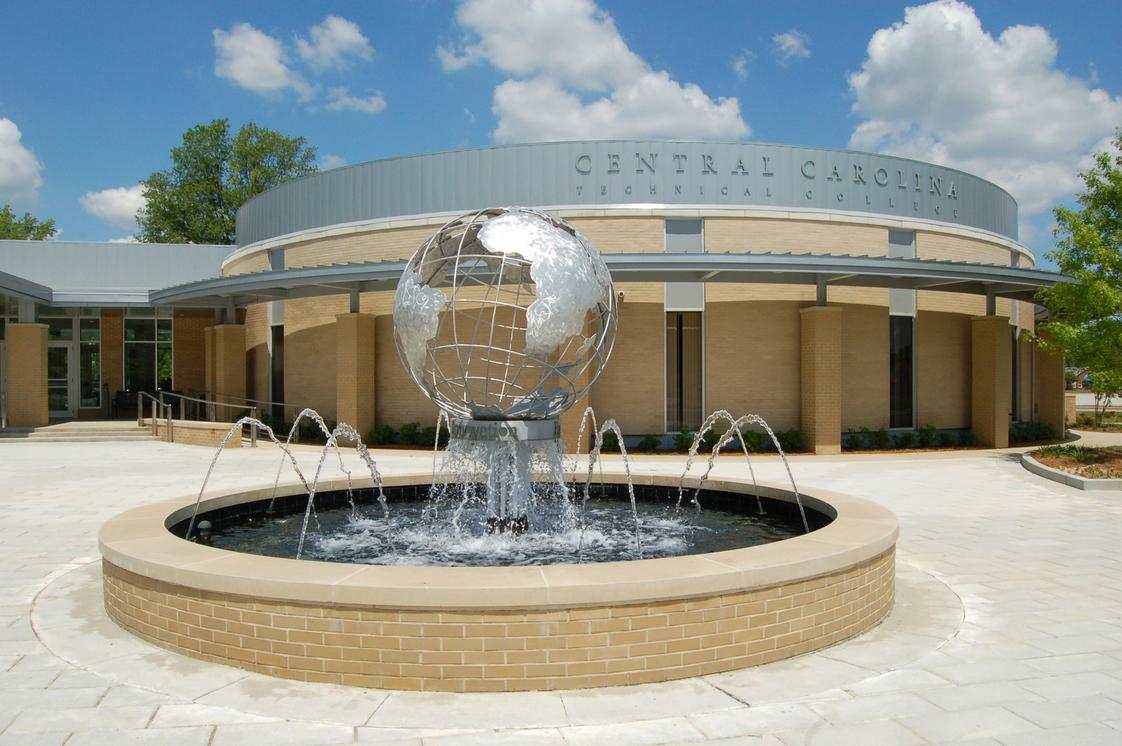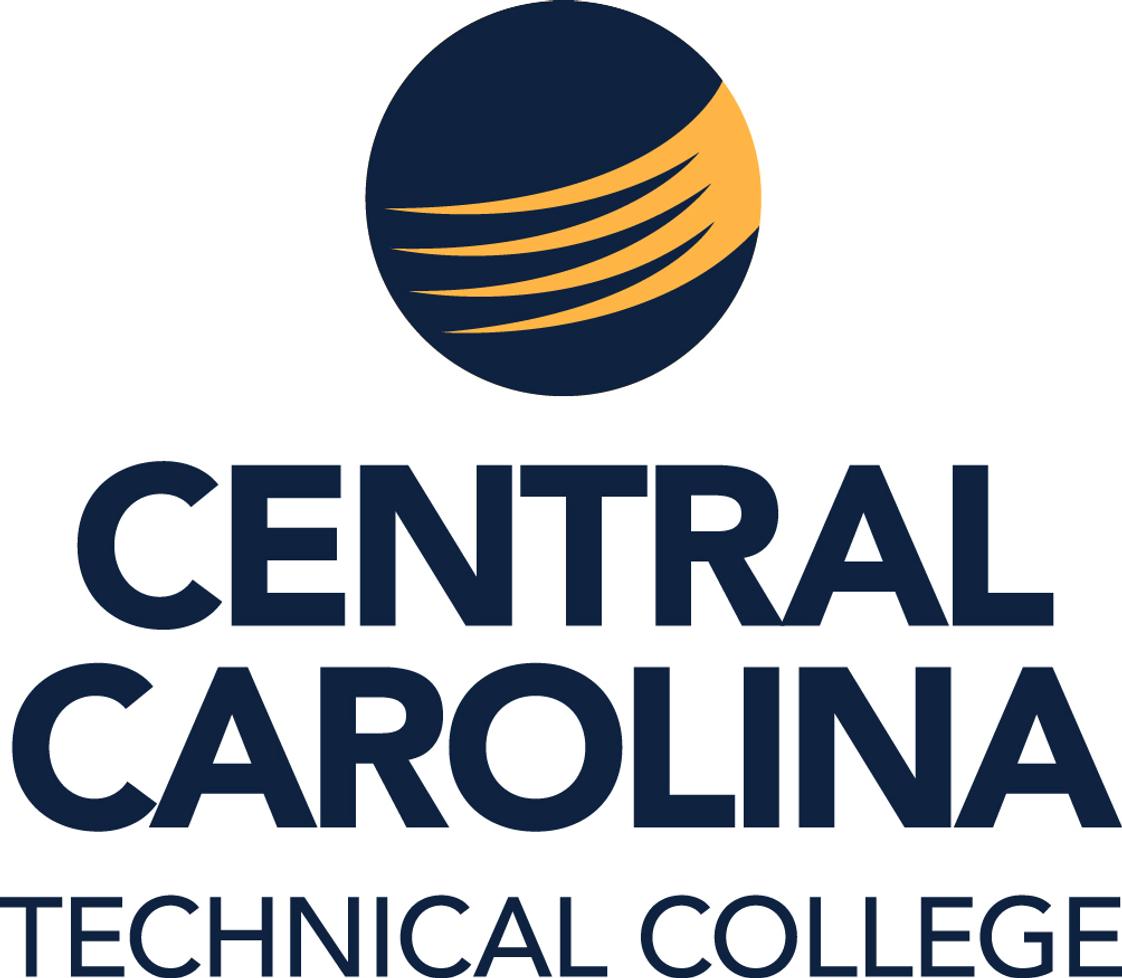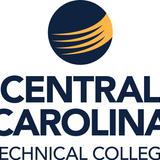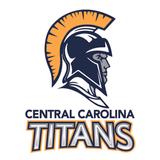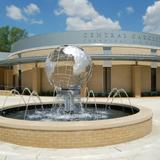- Central Carolina Technical College is a comprehensive, public, two-year institution of higher education that is dedicated to fostering a positive environment of teaching and learning for faculty, staff, and students. The College serves primarily the region of Clarendon, Lee, Kershaw, and Sumter counties in South Carolina and confers associate degrees, diplomas, and certificates. College programs and student support services provide citizens, businesses, industries, and communities with quality, affordable, accessible, customer-responsive post-secondary education through life-long learning and specialized training opportunities specifically designed to develop the foundation for personal growth, economic development, and an improved quality of life.
School Highlights
Central Carolina Technical College serves 4,489 students (23% of students are full-time).
The college's student:teacher ratio of 22:1 is higher than the state community college average of 18:1.
Minority enrollment is 56% of the student body (majority Black), which is more than the state average of 48%.
Quick Stats (2025)
- Enrollment: 4,489 students
- Student:teacher ratio: 22:1
- Minority enrollment: 56%
- Source: Verified school update
School Overview
The teacher population of 206 teachers has stayed relatively flat over five years.
Central Carolina Technical College
(SC) Community College Avg.
Carnegie Classification
Associate's Colleges: Mixed Transfer/Career & Technical-Mixed Traditional/Nontraditional
Associate's Colleges: High Vocational & Technical-High Traditional
Institution Level
At least 2 but less than 4 years
At least 2 but less than 4 years
Institution Control
Public
Public
Total Faculty
206 staff
177 staff
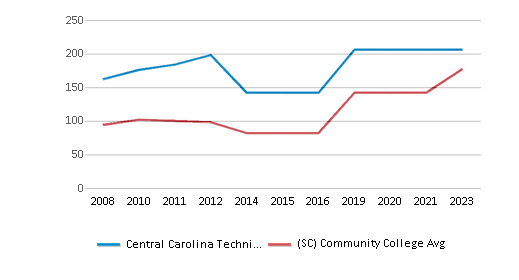
School Calendar
Student Body
The student population of Central Carolina Technical College has stayed relatively flat over five years.
The student:teacher ratio of 22:1 has increased from 14:1 over five years.
The Central Carolina Technical College diversity score of 0.60 is less than the state average of 0.63. The school's diversity has declined by 40% over five years.
Total Enrollment
4,489 students
2,253 students
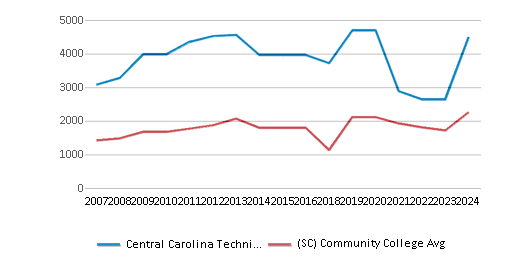
Student : Teacher Ratio
22:1
18:1
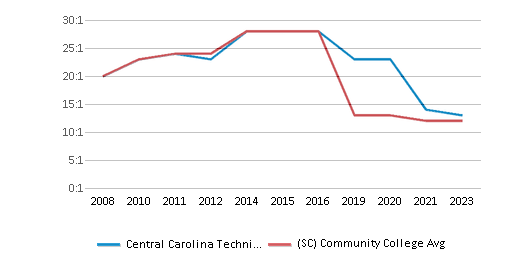
# Full-Time Students
1,034 students
622 students
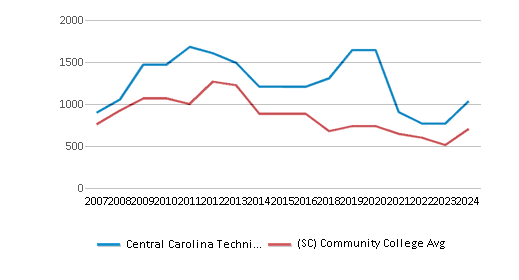
# Part-Time Students
3,455 students
1,349 students
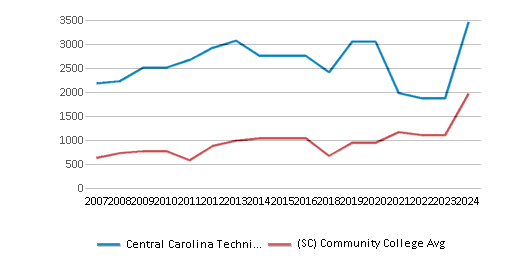
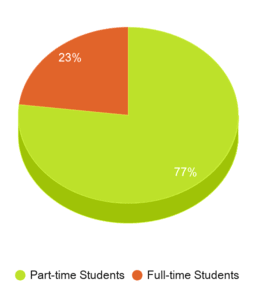
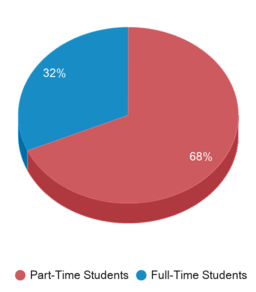
# Enrollment Undergraduate
448 students
279 students
# Full-Time Undergraduate Students
1,034 students
605 students
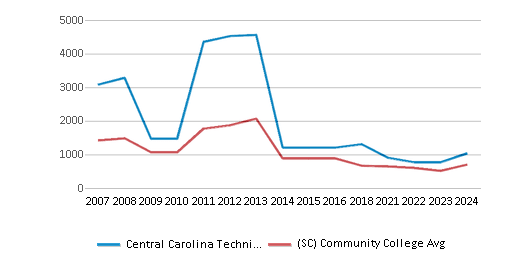
# Full-Time Graduate Students
n/a
8 students
# Part-Time Undergraduate Students
3,455 students
1,965 students
# Part-Time Graduate Students
n/a
32 students
Total Dormitory Capacity
n/a
260 students
% American Indian/Alaskan
n/a
n/a
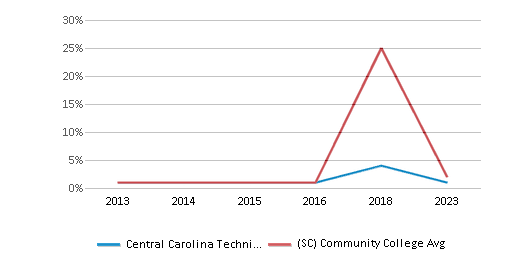
% Asian
1%
2%
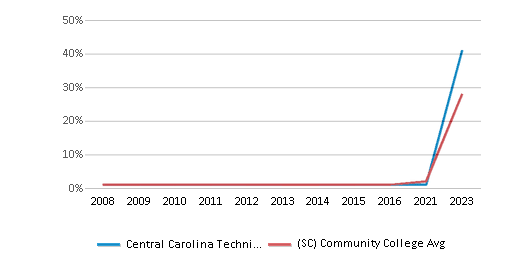
% Hispanic
5%
9%
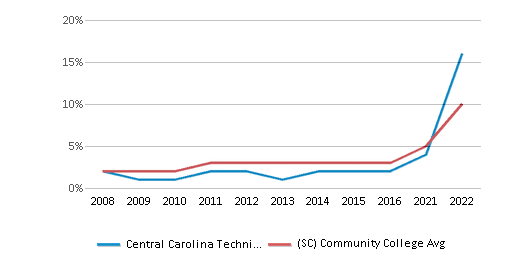
% Black
45%
29%
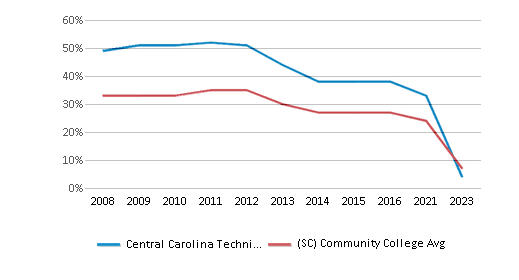
% White
44%
52%
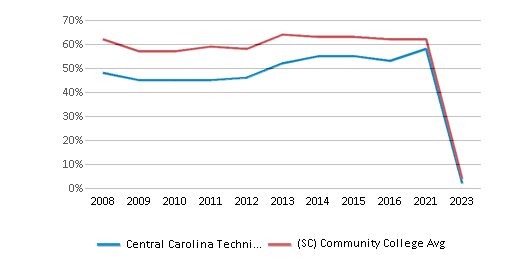
% Hawaiian
1%
n/a
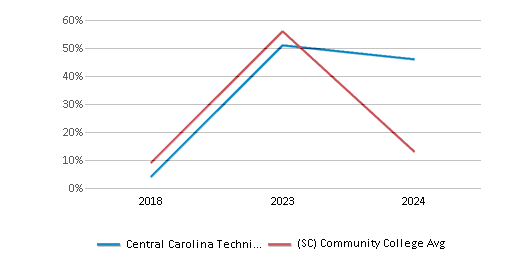
% Two or more races
3%
4%
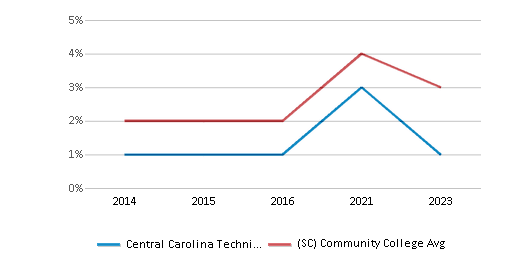
% Unknown races
n/a
4%
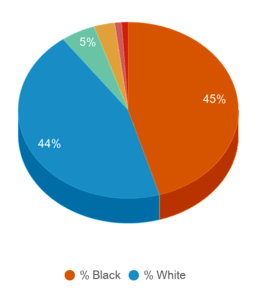
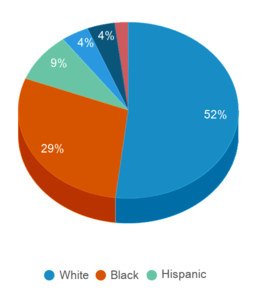
Diversity Score
0.60
0.63
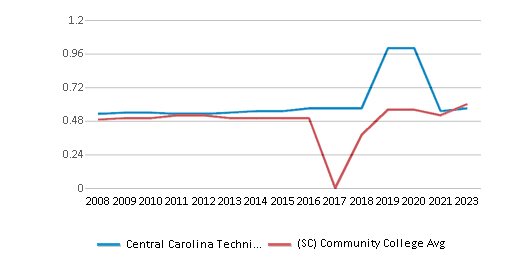
College Completion Rate (Students who graduate in less than 4 years)
0.2181%
0.2579%
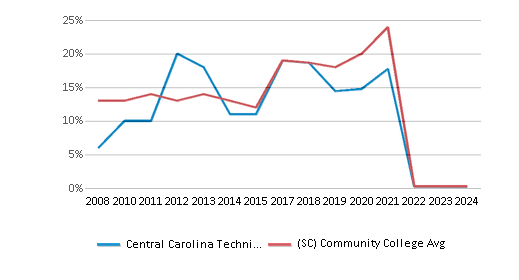
College Completion Rate (Students who graduate in 4 years or more than 4 years)
n/a
0.172%
Average Graduate Earnings (10 Years)
$28,800
$28,800
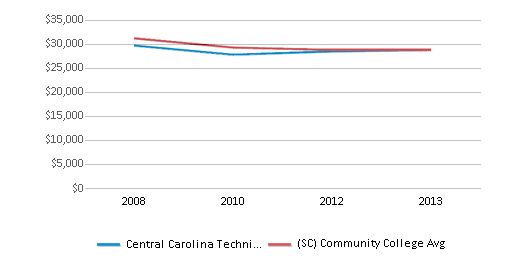
Tuition and Acceptance Rate
% Students Receiving Some Financial Aid
97%
93%
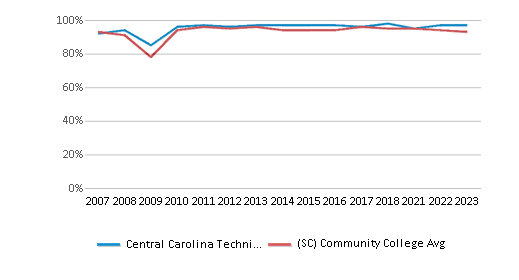
Median Debt for Graduates
$10,500
$11,729
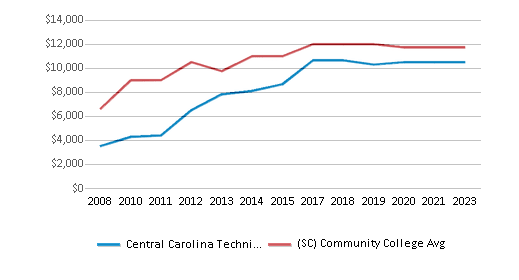
Median Debt for Dropouts
$6,263
$5,500
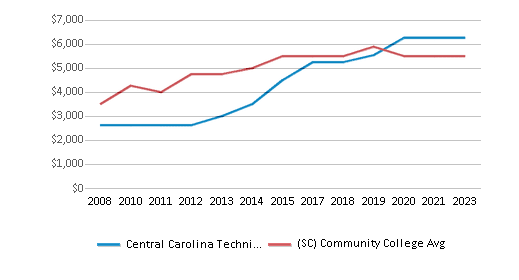
Acceptance Rate
n/a
88%
SAT Reading
n/a
430
SAT Math
n/a
458
SAT Writing
n/a
413
ACT Composite
n/a
18
ACT English
n/a
17
ACT Math
n/a
18
ACT Writing
n/a
6
Source: 2024 (or latest year available) Integrated Postsecondary Education Data System (IPEDS) , School Administrators
School Notes
- In 1961, a local committee began studying the feasibility of establishing an "industrial training center" to serve Sumter County. The committee's work culminated in 1962 with the passage of the enabling legislation, which created Sumter Area Technical Education Center. In 1971, the institution changed its name to Sumter Area Technical College. In 1989 the South Carolina Commission on Higher Education authorized Sumter Area Technical College to begin offering the Associate in Arts and the Associate in Science degree programs designed specifically for transfer to four-year colleges and universities. With the addition of the transfer programs, Sumter Area Technical College achieved the status of a comprehensive community college. In the fall of 1992, the College changed its name to Central Carolina Technical College to better reflect its service area. In 1998, the College assumed operation of the F. E. DuBose Career Center located in Clarendon County. In 2001, Central Carolina established the Kershaw County Campus in Camden. Central Carolina Technical College serves four counties in South Carolina: Clarendon, Kershaw, Lee and Sumter. To make it as convenient as possible for our students to attend class, we have a location in each of these counties. The main campus of the college is located in Sumter, South Carolina. The campus is comprised of various buildings that house the academic divisions of the College which include Health Sciences, Industrial and Engineering Technology, and Business and General Education. The College's vast array of associate degree, diploma, and certificate programs prepares students to enter the job market, to transfer to senior colleges and universities, and to achieve their professional and personal goals. Specifically, Central Carolina offers academic programs in business, the health sciences, public service, industrial and engineering technology, and the arts and sciences. Through its comprehensive programs and support services, the College annually serves over 4,500 credit students and 10,500 continuing education students in both traditional and non-traditional formats. Central Carolina Technical College is accredited by the Commission on Colleges of the Southern Association of Colleges and Schools to award associate degrees.
Recent Articles

Obtaining Your Bachelor's Degree at a Community College
Explore the evolving landscape of community colleges offering bachelor's degrees, addressing affordability, accessibility, and workforce needs.

A to Z of Community College Certificates and Courses
From business and healthcare to technology and skilled trades, the article showcases the breadth of options available to students seeking to enhance their knowledge, develop new skills, or pursue career advancement.

What is a Community College?
This comprehensive guide explains what a community college is, its history, and its role in higher education. It covers the types of programs offered, differences from four-year colleges, benefits of attending, and important considerations for prospective students, providing valuable insights for those exploring educational options.

